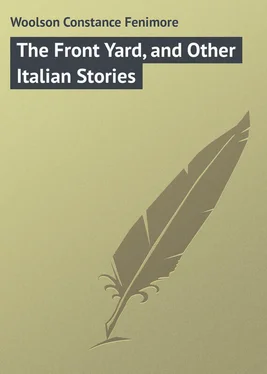Constance Woolson - The Front Yard, and Other Italian Stories
Здесь есть возможность читать онлайн «Constance Woolson - The Front Yard, and Other Italian Stories» — ознакомительный отрывок электронной книги совершенно бесплатно, а после прочтения отрывка купить полную версию. В некоторых случаях можно слушать аудио, скачать через торрент в формате fb2 и присутствует краткое содержание. Жанр: foreign_prose, на английском языке. Описание произведения, (предисловие) а так же отзывы посетителей доступны на портале библиотеки ЛибКат.
- Название:The Front Yard, and Other Italian Stories
- Автор:
- Жанр:
- Год:неизвестен
- ISBN:нет данных
- Рейтинг книги:4 / 5. Голосов: 1
-
Избранное:Добавить в избранное
- Отзывы:
-
Ваша оценка:
- 80
- 1
- 2
- 3
- 4
- 5
The Front Yard, and Other Italian Stories: краткое содержание, описание и аннотация
Предлагаем к чтению аннотацию, описание, краткое содержание или предисловие (зависит от того, что написал сам автор книги «The Front Yard, and Other Italian Stories»). Если вы не нашли необходимую информацию о книге — напишите в комментариях, мы постараемся отыскать её.
The Front Yard, and Other Italian Stories — читать онлайн ознакомительный отрывок
Ниже представлен текст книги, разбитый по страницам. Система сохранения места последней прочитанной страницы, позволяет с удобством читать онлайн бесплатно книгу «The Front Yard, and Other Italian Stories», без необходимости каждый раз заново искать на чём Вы остановились. Поставьте закладку, и сможете в любой момент перейти на страницу, на которой закончили чтение.
Интервал:
Закладка:
"The Americans are all mercenary," remarked old Pietro, waving his hand in scorn. "Being themselves always influenced by gain, they cannot understand lofty motives nor the cold, glittering anger of the nobility. The Leoncinis are noble; they are of the old Count's blood. They do not want their money; they want revenge – they want to rack my bones."
Granmar gave a long howl.
"Favor me, my niece, with no more of your mistakes," concluded Pietro, with dignity.
"I don't believe they'd refuse," said Prudence, unmoved. "I'll go and ask 'em myself, if you like; that'll be the best way. I'll go right away now." She began to fold up her work.
At this Pietro, after putting the scaldino safely on the stove, fell down in a round heap on the floor. Never were limbs so suddenly contorted and tangled; he clawed the bricks so fiercely with his fingers that Nounce, frightened, left her bench and ran into the next room.
"What's the matter with you? I never saw such a man," said Prudence, trying to raise him.
"Let be! let be!" called out Granmar; "it's a stroke; and you've brought it on, talking to him about working, working all day long like a horse – a good old man like that."
"I don't believe it's a stroke," said Prudence, still trying to get him up.
"My opinion is," said Granmar, sinking into sudden calm, "that he will die in ten minutes – exactly ten."
His face had indeed turned very red.
"Dear me! I suppose I shall have to run down for the doctor," said Prudence, desisting. "Perhaps he'd ought to be bled."
"You leave the doctor alone, and ease his mind," directed Granmar; "that's what he needs, sensitive as he is, and poetical too, poor fellow. You just shout in his ear that you'll pay that money, and you'll be surprised to see how it'll loosen his joints."
Mrs. Guadagni surveyed the good old uncle for a moment. Then she bent over him and shouted in his ear, "I'll make you a hot fig-tart right away now, Patro, if you'll set up."
As she finished these words Granmar threw her scaldino suddenly into the centre of the kitchen, where it broke with a crash upon the bricks.
"He's going to get up," announced Prudence, triumphantly.
"He isn't any such thing; 'twas the scaldino shook him," responded Granmar, in a loud, admonitory tone. "He'll never get up again in this world unless you shout in his ear that you'll pay that money."
And in truth Pietro was now more knotted than ever.
At this moment the door opened and Jo Vanny came in. "Why, what's the matter with uncle?" he said, seeing the figure on the floor. He bent over him and tried to ease his position.
"It's a stroke," said Granmar, in a soft voice. "It'll soon be over. Hush! leave him in peace. He's dying; Denza there, she did it."
"They want me to pay the nine francs he has – lost," said Prudence. "Perhaps you have heard, Jo Vanny, that he has – lost nine francs that belonged to the Leoncinis? Nine whole francs." She looked at the lad, and he understood the look; for only the day before she had confided to him at last her long-cherished dream, and (as she had been sure he would) he had sympathized with it warmly.
"I declare I wish I had even a franc!" he said, searching his pockets desperately; "but I've only got a cigarette. Will you try a cigarette, uncle?" he shouted in the heap's ear.
"Don't you mock him," ordered Granmar (but Jo Vanny had been entirely in earnest). "He'll die soon, and Denza will be rid of him; that's what she wants. 'Twill be murder, of course; and he'll haunt us – he's always said he'd haunt somebody. But I ain't long for this world, so I ain't disturbed. Heaven's waiting wide open for me ."
Jo Vanny looked a little frightened. He hesitated a moment, surveying the motionless Pietro; then he drew Prudence aside. "He's an awful wicked old man, and might really do it," he whispered; "'specially as you ain't a Catholic, mamma. I think you'd better give him the money if it'll stop him off; I don't mind, but it would be bad for you if he should come rapping on your windows and showing corpse-lights in the garden by-and-by."
Prudence brought her hands together sharply – a gesture of exasperation. "He ain't going to die any more than I am," she said. But she knew what life would be in that house with such a threat hanging over it, even though the execution were deferred to some vague future time. Angrily she left the room.
Jo Vanny followed her. "Come along, if you want to," she said, half impatient, half glad. She felt a sudden desire that some one besides herself should see the sacrifice, see the actual despoiling of the little box she had labored to fill. She went to the wood-shed. It was a gloomy December day, and the vegetables hanging on the walls had a dreary, stone-like look; she climbed up on a barrel, and removed the hay which filled a rough shelf; in a niche behind was her work-box; with it in her hand she climbed down again.
She gave him the box to hold while she counted out the money – nine francs. "There are twelve in all," she said.
"Then you'll have three left," said Jo Vanny.
"Yes, three." She could not help a sigh of retrospect, the outgoing nine represented so many long hours of toil.
"Let me put the box back," said the boy. It was quickly and deftly done. "Never mind about it, mamma," he said, as he jumped down. " I 'll help you to make it up again. I want that front yard as much as you do, now you've told me about it; I think it will be beautiful."
"Well," said Prudence, "when the flower-beds are all fixed up, and the new front path and swing gate, it will be kind of nice, I reckon."
"Nice?" said Jo Vanny. "That's not the word. 'Twill be an ecstasy! a smile! a dream!"
"Bless the boy, what nonsense he talks!" said the step-mother. But she loved to hear his romantic phrases all the same.
They went back to the kitchen. The sacrifice had now become a cheerful one. She bent over the heap. "Here's your nine francs, Patro," she shouted. "Come, now, come!"
Pietro felt the money in his hand. He rose quietly. "I'm nearly killed with all your yelling," he said. Then he took his hat and left the house.
"We did yell," said Prudence, picking up the fragments of the broken scaldino. "I don't quite know why we did."
"Never mind why-ing, but get supper," said Granmar. "Then go down on your knees and thank the Virgin for giving us such a merciful, mild old man as Pietro. You brought on his stroke; but what did he do? He just took what you gave him, and went away so forgivingly – the soul of a dove, the spice-cake soul!"
In January, the short, sharp winter of Italy had possession of Assisi.
One day towards the last of the month a bitter wind was driving through the bleak, stony little street, sending clouds of gritty, frozen dust before it. The dark, fireless dwellings were colder than the outside air, and the people, swathed in heavy layers of clothing, to which all sorts of old cloaks and shawls and mufflers had been added, were standing about near the open doors of their shops and dwellings, various prominences under apron or coat betraying the hidden scaldino, the earthen dish which Italians tightly hug in winter with the hope that the few coals it contains will keep their benumbed fingers warm. All faces were reddened and frost-bitten. The hands of the children who were too young to hold a scaldino were purple-black.
Prudence Guadagni, with her great basket strapped on her back, came along, receiving but two or three greetings as she passed. Few knew her; fewer still liked her, for was she not a foreigner and a pagan? Besides, what could you do with a woman who drank water, simple water, like a toad, and never touched wine – a woman who did not like oil, good, sweet, wholesome oil! Tonio's children were much commiserated for having fallen into such hands.
Читать дальшеИнтервал:
Закладка:
Похожие книги на «The Front Yard, and Other Italian Stories»
Представляем Вашему вниманию похожие книги на «The Front Yard, and Other Italian Stories» списком для выбора. Мы отобрали схожую по названию и смыслу литературу в надежде предоставить читателям больше вариантов отыскать новые, интересные, ещё непрочитанные произведения.
Обсуждение, отзывы о книге «The Front Yard, and Other Italian Stories» и просто собственные мнения читателей. Оставьте ваши комментарии, напишите, что Вы думаете о произведении, его смысле или главных героях. Укажите что конкретно понравилось, а что нет, и почему Вы так считаете.












